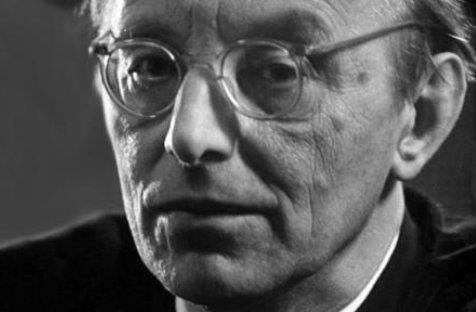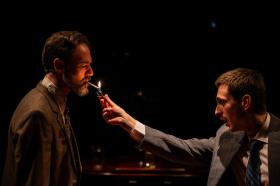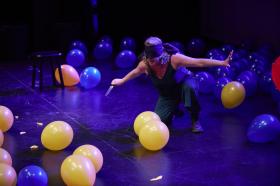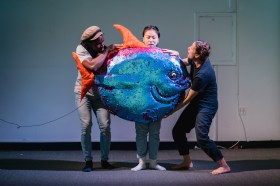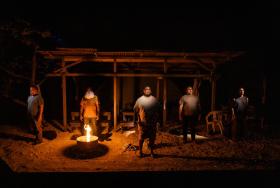In this, the third of a five-concert series, St George’s Cathedral presented two well-known works by two not-so-well-known composers: Constant Lambert and Carl Orff. The program featured soloists Isabelle Freeman (soprano), Paul McMahon (tenor), Robert Hoffmann (baritone) and the Cathedral’s own choir and consort. Instrumentals were provided by pianists Mark Coughlan and Emily Green-Armytage, together with the WASO Percussion Ensemble, the whole shebang being under the skilful baton of Joseph Nolan.
Nolan is a versatile musician of wide experience, having played the organ at Buckingham Palace and in many concert halls and on radio world-wide. His overarching musicianship has enabled him to lift the cathedral choir to a very high standard of performance. He has also been responsible for founding the Cathedral Consort, a professional choir that sings evensong at the cathedral several times a month. From tiny boys to well-schooled adults, the entire ensemble as presented for this concert must rank high amongst cathedral choirs and consorts in this country.
The choice of material for this program is interesting. We hear little of the works of Lambert (1905-1951) and Orff (1895-1982), and when we do, it is usually these very two that are mentioned. They make a good pairing.
The first item, The Rio Grande, is a setting of a poem of the same name by Sacherverell Sitwell for chorus with piano, brass, strings and percussion. This arrangement dispenses with the brass and strings and replaces them with a second piano. The WASO Percussion Ensemble, consisting of permanent and casual players in the West Australian Symphony Orchestra, played an important role in the performance of both pieces on the program. Both depend heavily on rhythm, although this is more the case with the second item, Carmina Burana.
Found in 1803 in the Benedictine monastery of Benediktbeuern, Bavaria, the poems of Carmina Burana, dating from the 11th to the 13th centuries and set to music by Carl Orff are not of the kind we would associate with monks today. Definitely secular, often satirical and sometimes verging on the bawdy, the verses, written in a mixture of Latin, Middle High German and Old Provençal, do not fear to sing the praises of pagan deities. The well-known opening chorus, ‘O Fortuna’, hails the spinner of the wheel of fortune as Empress of the World, and other items include references to Bacchus and his sphere of influence, the production and consumption of alcohol. And Venus, of course, must rate a mention. No, indeed: ‘I am bursting out all over! I am burning all over with first love’, is not language we would associate with monks!
The choir handled the difficult lyrics in the original languages admirably. I for one was very glad of the translation provided in the very useful and comprehensive printed program.
I would especially like to mention the lovely renditions of the pieces in the Court of Love section of Carmina Burana. The three solo singers and the boy choristers, especially, provided a treat for the ears. The tragi-comic ‘Roast Swan’ in the Tavern scene, performed with appropriate melodrama by Paul McMahon, was especially well received.
Carmina Burana was originally scored for a large orchestra with augmented woodwinds and brass and an enormous percussion section. However, it has frequently been performed by a smaller ensemble featuring two pianos and a variety of percussion instruments. This arrangement worked extremely well. Throughout the program, I was vastly entertained by the enthusiasm of the percussion players. They boast the biggest pair of cymbals I’ve ever seen, and clash them with élan: likewise the enormous drum that James Chong, a recent WAAPA graduate, played with great fervour. This ensemble must be unique in that it includes two female percussion players in a world where even one such is a rarity. The WASO artists, along with the two very skilled and enthusiastic pianists and the excellent solo singers, are to be commended on a first-rate performance.
St George’s Cathedral Concert Series 2013 presents
As part of the City of Perth Winter Arts Season:
Orff’s Carmina Burana
Joseph Nolan – Conductor
St George’s Cathedral Choir & Consort
Isabelle Freeman – Soprano
Paul McMahon – Tenor
Robert Hofmann – Baritone
Mark Coughlan & Emily Green-Armytage – Pianists
WASO Percussion Ensemble: Paul Tanner, Tony Greatz, Timothy White, Robyn Gray, Amanda Dean and James Chong
Constant Lambert – The Rio Grande
Carl Orff – Carmina Burana
St George’s Cathedral, Perth
16 August
(Pictured: German composer Carl Orff (1895 – 1982))
